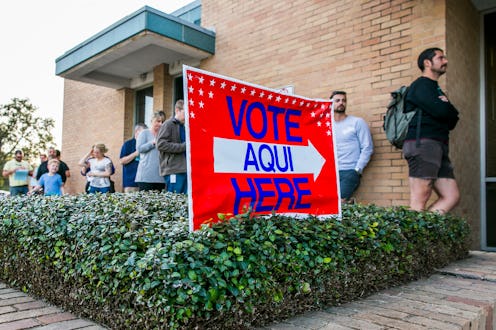News
This Update On A Texas Woman Who Has To Serve 5 Years For Voter Fraud Is Hard To Believe

In 2016, while on supervised release from jail for felony tax fraud, Crystal Mason voted illegally in the presidential election, after her mother had suggested she cast her ballot. The problem is, Mason says she didn't know that what she had done was illegal. Now, her request for a retrial has been denied, and she's facing five years in prison.
When she arrived at her voting place back in November 2016, since she was not on the voter roll, Mason received a provisional ballot her attorney at the time, J. Warren St. John, told NPR. But by casting that provisional ballot, she broke a Texas state law that says residents are prohibited from voting until they've completely served out their sentence. This law includes probation, parole and, in Mason's case, supervision. In multiple interviews, she has maintained that it was an honest mistake, and that she wasn't even aware of the law in the first place.
"She had a good faith belief that she could vote," St. John told NPR back in March. "She would have never voted if she didn't know she could vote."
In March, Mason was first sentenced to five years in prison for breaking the voting law, but is currently out on a $20,000 bond, the Huffington Post reports. She had requested a new trial under the motion that the court didn't consider the evidence that she didn't know she would be ineligible to vote. On Monday, June 11, however, she was denied this retrial.
"She didn't understand!" St. John said to NPR after the judge first announced the prison sentence. "She was never told she couldn't vote. Not by a district judge. Not by anyone at the half-way house where she lived after she got out. Not by the probation officer."
Mason's case has garnered national attention — and not just because of voting laws. According to the Huffington Post, "charges of institutional racism have surfaced" as well. For example, Russ Casey, a white justice of the peace in the county that Mason is also a resident of, forged signatures to get on the ballot for re-election. Though he pleaded guilty, his original two year prison sentence was suspended and he was placed on probation for five years, in addition to resigning, paying a $1,000 fine, and agreeing to avoid government buildings.
“The disparate treatment of these individuals is stark and clearly related to race,” Beth Stevens, voting rights program director at the Texas Civil Rights Project, told HuffPost, saying that Casey was “a judge, and clearly should be held to a higher standard and engaged in actual active fraud.”
Mason's current attorney, Alison Grinter, said in an interview with the Star-Telegram that it was an "uphill struggle to get the judge who made the initial ruling to change his mind."
"She's one step closer to going to prison for a vote that didn't even count," Grinter said. "Hopefully, we'll be able to get this case before fresh eyes in the appellate court and have a better outcome."
And there may be hope. According to the Star-Telegram, a court brief from the Texas Civil Rights Project and American Civil Liberties Union Foundation of Texas says that the law that Mason was convicted under is surpassed by a federal statute from 2002. That statute gives someone who thinks they're able to vote the right to cast a provisional ballot in federal elections, "shifting the burden of proof to the state."
According to one of the Texas Civil Rights Project attorneys who helped put the brief together, Rebecca Stevens, the statue from 2002 as interpreted by the court brief works in Mason's favor because she voted with a provisional ballot in a federal election.
"Of the prosecutions we've seen engaging in election misconduct, the sentence that Mason received is far more aggressive," Stevens said to the Star-Telegram. "The problem with that, at least anecdotally, is that people of color are being prosecuted to the fullest extent of the law, versus an election official actually forging signatures who got probation."
"Those who are working to suppress voting need to prove that in-person voting fraud is a real thing," Grinter said. "And they use cases like this to do that. It's sad those kinds of efforts have to stand on the backs of people like Crystal."